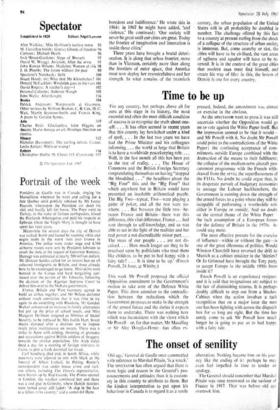Time to be up
'For any country, but perhaps above all for ours at this stage in its history, the most essential and often the most difficult condition of success is to recognise the truth about one- self. . . . It has often seemed in recent years that this country lay bewitched under a kind of spell. . . . In the last two years we have had the Prime Minister and his colleagues informing . . . the world at large that Britain is to have a worldwide peacekeeping role.... Well, in the last month all this has been put to the test of reality. . . . The House of Commons and the British Foreign Secretary congratulating themselves on having "stopped the bloodshed . ." the headlines about the "Big Four" this and the "Big Four" that which anywhere but in Britain would have presented an insoluble arithmetical puzzle. The Big Two—repeat, Two—were playing a game of poker, and all the rest were no- where. . . . But between the little twobe- tween France and Britain—there was this difference, this vital difference. France ... had won through to self-knowledge, and so was able to act in the light of the realities and her real power a not discreditable minor part.... The' mass of our people . . . are not de- ceived. . . . How much longer are they to be practised upon by politicians who treat them like children, to be put to bed happy with a fairy tale? . . It is time to be up.' (Enoch Powell, 24 June, at Whitby.) This week Mr Powell proposed the official Opposition amendment to the Government's motion to take note of the Defence White Paper. This drew attention to the contradic- tion between the reductions which the Government Proposes to make in the strength of the armed forces and the duties it expects them to undertake. There was nothing here which was inconsistent with the views which Mr Powell--or, for that matter, Mr Maudlin or Sir Alec Douglas-Home—has often ex- pressed. Indeed, the amendment was almost an exercise in the obvious.
As the SPE-CTATOR went to press it was still uncertain whether the Opposition would go on to vote against the White Paper itself. But the impression seemed to be that it would— and Mr Powell with it. No doubt Mr Powell cOuld.point to the contradictions of the White Paper: the continuing acceptance of com- mitments outside Europe combined with the destruction of the means to their fulfilment; the collapse of the medium-term aircraft pro- curement programme with the French With- drawal from -the AFVG; the superfluousness of the Fills. No doubt he could argue that, in its desperate pursuit of-budgetary economies to assuage 'the Labour backbenchers, the Government is running dciwn the strength of the armed forces to a point where they will be incapable of peiforming ' worthwhile 'role either in Europe or outside: 'And no doubt on the 'central theme of the White Paper--- the tacit assumption of a European forum for the defence of Britain in the 1970s lie could stay mute.
The most effective posture for the exercise of influence—within or without the gate-is one of the great dilemmas of politics. Would Winston Churchill have reversed the drift to Munich as a cabinet minister in the IhirtieS? Or Jo Grimond have brought the Tory party to accept Europe in the middle 1950s front inside it?
Enoch Powell is an experienced resigner, and it is said that resignations are subject to the law of diminishing returns. It is perhaps doubly difficult to step out from a Shadow Cabinet when the action involves a tacit recognition that on a major issue the men one has been fighting with across the dispatch box for so long are right. But the time has surely come to ask Mr Powell how much longer he is going to put us to bed happy with a fairy tale.






























 Previous page
Previous page